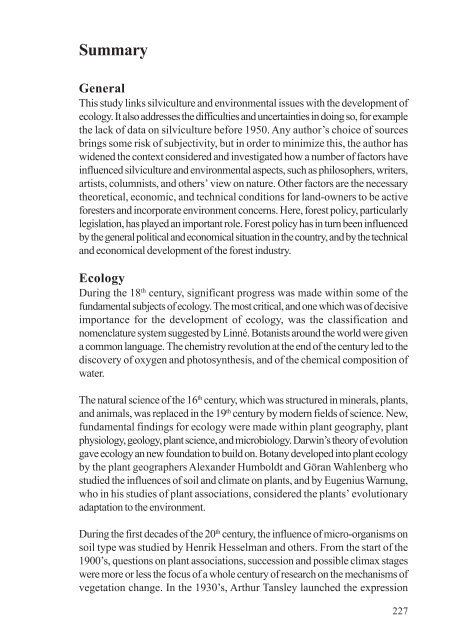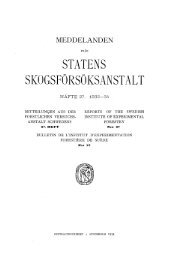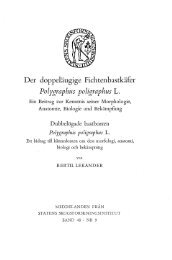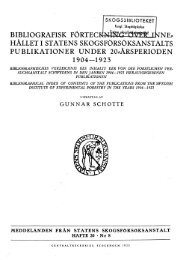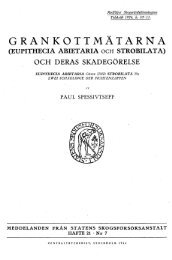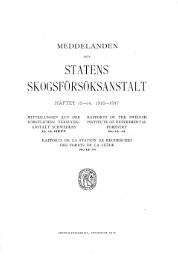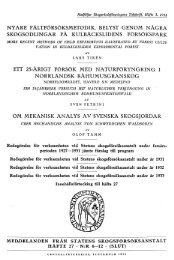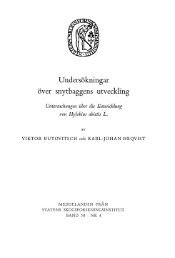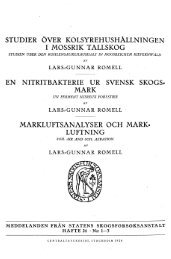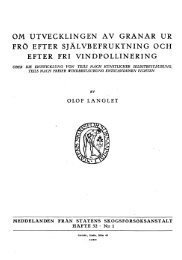Ekologi, skog och miljö - Epsilon Open Archive - Sveriges ...
Ekologi, skog och miljö - Epsilon Open Archive - Sveriges ...
Ekologi, skog och miljö - Epsilon Open Archive - Sveriges ...
Create successful ePaper yourself
Turn your PDF publications into a flip-book with our unique Google optimized e-Paper software.
Summary<br />
General<br />
This study links silviculture and environmental issues with the development of<br />
ecology. It also addresses the difficulties and uncertainties in doing so, for example<br />
the lack of data on silviculture before 1950. Any author’s choice of sources<br />
brings some risk of subjectivity, but in order to minimize this, the author has<br />
widened the context considered and investigated how a number of factors have<br />
influenced silviculture and environmental aspects, such as philosophers, writers,<br />
artists, columnists, and others’ view on nature. Other factors are the necessary<br />
theoretical, economic, and technical conditions for land-owners to be active<br />
foresters and incorporate environment concerns. Here, forest policy, particularly<br />
legislation, has played an important role. Forest policy has in turn been influenced<br />
by the general political and economical situation in the country, and by the technical<br />
and economical development of the forest industry.<br />
Ecology<br />
During the 18 th century, significant progress was made within some of the<br />
fundamental subjects of ecology. The most critical, and one which was of decisive<br />
importance for the development of ecology, was the classification and<br />
nomenclature system suggested by Linné. Botanists around the world were given<br />
a common language. The chemistry revolution at the end of the century led to the<br />
discovery of oxygen and photosynthesis, and of the chemical composition of<br />
water.<br />
The natural science of the 16 th century, which was structured in minerals, plants,<br />
and animals, was replaced in the 19 th century by modern fields of science. New,<br />
fundamental findings for ecology were made within plant geography, plant<br />
physiology, geology, plant science, and microbiology. Darwin’s theory of evolution<br />
gave ecology an new foundation to build on. Botany developed into plant ecology<br />
by the plant geographers Alexander Humboldt and Göran Wahlenberg who<br />
studied the influences of soil and climate on plants, and by Eugenius Warnung,<br />
who in his studies of plant associations, considered the plants’ evolutionary<br />
adaptation to the environment.<br />
During the first decades of the 20 th century, the influence of micro-organisms on<br />
soil type was studied by Henrik Hesselman and others. From the start of the<br />
1900’s, questions on plant associations, succession and possible climax stages<br />
were more or less the focus of a whole century of research on the mechanisms of<br />
vegetation change. In the 1930’s, Arthur Tansley launched the expression<br />
227


